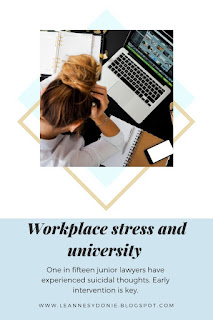"One in Fifteen junior lawyers have experienced Suicidal Thoughts": Workplace stress and University
I read this morning that one in fifteen junior lawyers have
had suicidal thoughts[1].
As someone nearly in this demographic, I am honestly not surprised. Suffering
from issues with low mood and anxiety throughout my teens, I could easily be somebody
in this demographic in the near future.
This study was done in regards to junior lawyers in the workplace, and focused on stress. I discuss the journey we take as young lawyers, and how stress could be better managed from the very beginning. Mental health is incredibly important, and despite a growing recognition of this, many people do not have adequate support. At such a time of change and development in our lives, support is vitally important.
This study was done in regards to junior lawyers in the workplace, and focused on stress. I discuss the journey we take as young lawyers, and how stress could be better managed from the very beginning. Mental health is incredibly important, and despite a growing recognition of this, many people do not have adequate support. At such a time of change and development in our lives, support is vitally important.
The Law at University
The law is stressful, and this begins on day one of law
school. We are not physically worked as hard as other students; such as nursing
students, who have to work 37.5 hour weeks on top of their studies while on
placement, but law students do have an incredible mental battle while studying.
For many, it is an adjustment to self-study. We have ten hours in university lectures
and tutorials in first year. There is less support available from a lecturer if
compared to a school teacher, especially considering how scary it is to approach
lecturers if there is a problem. The atmosphere of lecture theatres often
results in students feeling like they cannot ask questions without being seen
as stupid, as if we do not belong in that room. This is of course wrong, and
lecturers are most often more than willing to help with any issues that arise,
but we are still reluctant to speak to them. The way of studying the law at
university is also new; a significant drop in your grades from As and Bs at
school to Ds and Cs in the first semester of university is common. And then there
is of course the fact that adjustment to university is often hard anyway, away
from home and our support networks.
I work as a Student Support Assistant for my university. As
a Student Support Assistant, I aim to help first years adjust to their new
lives in residences. My contact details are displayed in the kitchens of the
flats I cover, and I visit students once a month to check in with them. I can
help with almost anything, from a dirty kitchen sink and routine flat
arguments, to actively suicidal students who are in a moment of crisis, and if
I can’t help, I will get you somebody who can. I have been given lots of mental
health training for my role, including suicide first aid (ASIST training).
University can be extremely stressful and not what students are expecting.
Personally, I experienced intense homesickness and loneliness
in my first year, which made studying hard. I was hundreds of miles away from
my family and friends, unable to go home for weekend visits, living in a brand-new
environment, with strangers in a big city. There were times I was hiding under
my bedsheets rather than walk the two minutes to a lecture theatre because my
anxiety would get the better of me and wow,
you can fit so many people into such a small room.
With the support of the university, I began getting weekly
sessions with a support worker to talk through what I was struggling with. I
became feeling much more settled and capable in my second semester of university
and by second year, I felt like a brand-new person. But if a student cannot
access these supports, it can be so much harder to feel settled. Many universities
aim to have better mental health support available. Here at Dundee, we have the
Counselling Service as well as the Student Support Team (hi, that’s me), DUSA the
Union’s Hive, Nightline, and links with other organisations who offer mental
health support. Other universities are simply unable to provide much support,
especially considering that...
Mental health issues are on the rise anyway
Especially in younger people. NHS England have estimated
that 12.8% of young people aged 5-19 are dealing with a mental health disorder
of ‘some kind’.[2]
This doesn’t take into consideration the numbers for the rest of the UK. This
is more than one in eight young people.
When more and more young people are struggling with mental
ill health, this will inevitably drag through university and into the workforce.
The demand for mental health services is increasing nationally, and we are
struggling to cope with the demand.
Students will often be heading straight into the workplace for their traineeship after university. Students spend time in law firm environments throughout their undergraduate degree: work experience, insight days, summer placements, internships. Support has to be available to students as they navigate into this new world.
We are working well to demolish the stigma of mental health,
we are talking more openly, but removing the stigma is not enough. The infrastructure
of professional support has to exist, and awareness of the support available has
to increase. It is well publicised that the NHS is struggling; services are
being cut back, GPs do not have any time, mental health services are
oversubscribed. As someone who needed years of therapy and support through CAMHS
{Child and Adolescent Mental Health Service} but was initially allocated six
weeks of anxiety CBT, the services are unfortunately limited significantly. But
there are other organisations that can and will help: Childline, The
Samaritans, Mind, even if these organisations are also dealing with increased
demand.
The law itself
I remember a case from first year vividly. Titchener v British
Railways Board [1984]. In this case, a young couple trespassed onto a railway
to spend some time together. The pursuer was hit by a train and killed, but,
because she was aware crossing the railway would be dangerous, she therefore consented
to the risk, and was entirely at fault, so there would be no damages paid. For some
reason, I went home from this lecture in tears. It wasn’t even the most
traumatic case we’ve learnt about, and the legal logic is sound, but I was
deeply upset by the topic. The law is the law and chances are, when working in
the law, we will come across traumatic things.
I enjoy learning about family law; I find the dynamics
really interesting. However, many of the cases surround divorce and family breakdown.
When going into practice, if I am a family lawyer, divorcing couples will be my
‘bread and butter’. I will be surrounded by emotional clients who are going
through one of the most traumatic times of their lives, and I will be a key
player in helping that client. That will be an incredibly stressful position to
be in, and I could be balancing multiple clients a day.
Stress is common in the legal workplace. The work is
intense, we have to argue with smart people all the time, and we have to look
after clients. It is no surprise then, that in the same study of young lawyers,
93.5% of respondents said they had experienced workplace stress[3].
There is an aspect of proving yourself when it comes to the
law. A common phenomenon is that of ‘imposter syndrome’, described as “a
psychological pattern in which an individual doubts their accomplishments and
has a persistent internalized fear of being exposed as a ‘fraud’”. This is
something experienced by many young lawyers and law students. We are surrounded
by intelligent people all the time, who all seem to ‘get it’ [and often flaunt
that they do]. I see this at university;
some students come to tutorials with so much knowledge and additional questions
that I wonder how I even got to the same university as them. I imagine this
follows you to the workplace. Your early years, when you are a newly qualified
lawyer, working at a million miles an hour, dealing with clients, monetary
transactions, the distinct feeling that what you are doing has a real impact. I
can see how this would make you feel like a fraud, even if you are entirely
capable.
Law firms are stressful environments, with long hours and
hard work. This is moreso when it comes to larger firms, the Magic Circle in particular.
High stress will not be any help to the new generation of lawyers coming into
the workforce- potentially after years of lack of support, and a rising level of
national mental illness in our young people.
Workplace stress must be explored, and workplaces must
provide support. But taking this back to university; students should also be able to
access useful support while studying. Law students should be able to build a support
network that works, and will support them through the potentially traumatic study
of law.
It is not a case of ‘if you find cases traumatic, you
shouldn’t be doing law’. We are human, and we will get emotional during cases.
We can compartmentalise, and indeed we often do, but when we are rushing
through our three or four years for our degree, our diploma, and a traineeship
to get our foot into the door for a career, we should be able to process the
emotions we feel. Often, we start our degrees at eighteen. We may be personally
affected by the issues explored in modules; we may be victims of crime, our
parents may be divorced. At university, we are often young, away from our
support networks, and surrounded by a drinking culture that could result in
some unhealthy coping mechanisms. We should be able to reach out to the support
available to us before our stress follows us into the workplace.
I am glad to be part of the support available to students, and
I want to help.
Leanne-Sydonie x
If a student at the University of Dundee:
Pop into the Enquiry Centre on campus [next to DUSA] and ask
for a Student Support Advisor
If living in university residences, contact your Student Support Assistant
If living in university residences, contact your Student Support Assistant
Some helplines if needed:
Samaritans
Confidential support for people experiencing feelings of
distress or despair.
Phone: 116 123 (free 24-hour helpline)
Website: www.samaritans.org.uk
SANE
Emotional support, information and guidance for people
affected by mental illness, their families and carers.
SANEline: 0300 304 7000 (daily, 4.30 to 10.30pm)
Textcare: comfort and care via text message, sent when the
person needs it most: http://www.sane.org.uk/textcare
Peer support forum: www.sane.org.uk/supportforum
Website: www.sane.org.uk/support
LawCare
Helpline Support: 0800 279 6888
Monday - Friday 9am–7.30pm, weekends & bank holidays 10am–4pm
Monday - Friday 9am–7.30pm, weekends & bank holidays 10am–4pm
[1] https://www.lawgazette.co.uk/news/one-in-15-junior-lawyers-has-had-suicidal-thoughts-research-shows/5069907.article
[2] https://www.psychotherapy.org.uk/ukcp-news/millennial-mindset/official-nhs-data-reveals-rise-in-mental-health-issues-among-children/
[3] https://www.legalcheek.com/2019/04/one-in-15-junior-solicitors-is-suicidal-research-finds/


Comments
Post a Comment